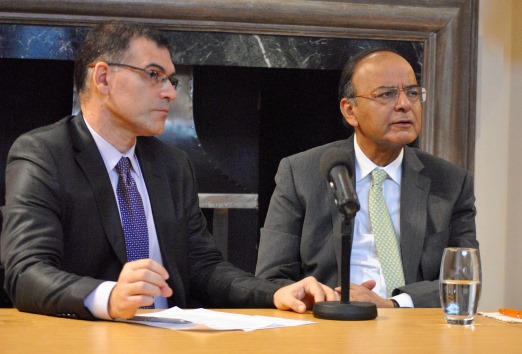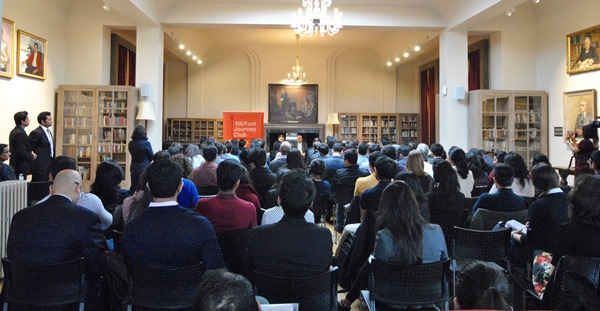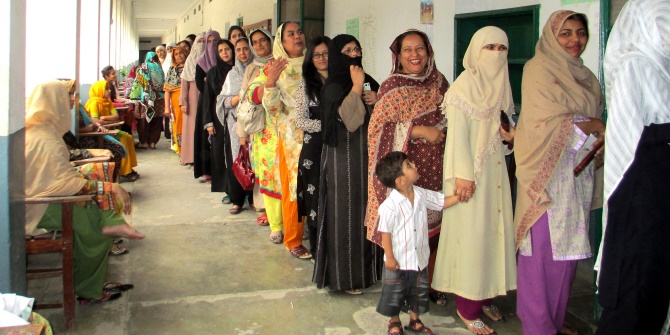During his recent visit to the UK, the Minister of Finance of the Government of India Mr Arun Jaitley visited LSE to discuss his economic vision for India and engage in an audience discussion. The 100 Foot Journey Club event, held in partnership with the High Commission of India, was jointly hosted by the South Asia Centre and Financial Markets Group Research Centre. In this post, some of the LSE staff and students who participated in the event reflect on the Minister’s presentation and responses to their questions.
On Saturday 25 February, Union Minister for Finance Mr Arun Jaitley spoke at LSE and took questions from the audience. His opening presentation on the topic ‘Transforming India: Vision for the next decade’ was not particularly groundbreaking, but as a minister on an official trip to the UK this was expected. Reprimanding India’s shortcomings in its post-independence era, when political divisiveness overtook economic prosperity and the world mocked the ‘Hindu rate of growth’, the finance minister ardently emphasised the paradigm shift which is inspiring a new status quo: growing impatience within the aspirational middle classes, rising public support coupled with strong social media outcry, reforms eliminating corruption, driving forces of competitive federalism, and streamlined decision-making within government were all cited as emerging trends in the coming decades.
Further, while recognising that the mercurial oil market and global economic turmoil pose profound risks to India’s growth, the minister unequivocally reiterated a sustainable growth rate of 7 to 8 percent as the ‘new Indian norm’ in the foreseeable future. However, this confident forecast should be read alongside the current debates among economists around the inexplicable growth rate of 7.2% announced on 1 March, matching a figure forecast by several months ago before the decision to ban Rs.500 and Rs.1000 notes should be kept in mind.

The 40-minute Q&A, during which several students and members of LSE faculty posed questions, was more illuminating. A wide range of topics – ranging from opportunities for young people returning from studying abroad, demonetisation without infrastructure, and the widespread use of the term ‘anti-national’ since 2014 – were raised.
Reflecting on the recent wave of transformative reforms, Mr Jaitley justified demonetisation by arguing that India’s parallel cash economy had disproportionately cost the Indian poor. He claimed that the tax evader continued to unjustly enrich himself while the compliant paid both his own tax and the share of the non-compliant. He identified key challenges, from fixing the non-compliant tax system, unifying India into a single tax market to integrating the formal and informal economy, and reforming the banking sector. However, Mr Jaitley remained resolutely confident that demonetisation combined with the rural digitisation initiative, comprehensive electrification by 2018 and the revolutionary goods and services tax (GST) bill will not only address these ambitious goals, but also spur a larger and cleaner GDP. He reiterated his commitment towards business-friendly and freer trade policies, prioritising investment in manufacturing, infrastructure and development to substantially accelerate job creation. While dividends of the audacious reforms are as yet uncertain, Mr Jaitley’s closing statement beckoned a promise of economic prosperity for the aspiring nation.
An LSE professor challenged the Finance Minister on the issue of corruption, asking how demonetisation could hope to curb the problem when so much of it has to do with problems in our institutions, such as the political system, the bureaucracy and the nexus with big business. He stressed that cash may at best be the medium in which some corruption transactions take place or the form in which a small fraction of the ill-begotten wealth is stored. This is especially true given that corruption will continue with the new notes, and there will be huge number of the non-corrupt, especially the poor in the informal sector, who were predictably hurt. Why not go after corrupt practices of big companies, such as corporate loan defaulters, or cut the many subsidies that corporate houses enjoy?
In his response Mr Jaitley made two points. He did not think that – of the many-pronged actions that are needed to battle corruption – taking one action precludes taking others. This did not quite respond to concern that demonetisation may at best have limited usefulness, and at worst have large unintended negative consequences. He also said that the government is in fact taking actions to bring corporate loan defaulters to the book. He said, “it is the first time that you have strong action being taken. In fact, it has never happened that defaulters are on the run. The fact that they are on the run and their properties are being targeted is a signal that India as a country is sending for the first time. Otherwise, we had learned to live with defaulters.”
Mr Jaitley’s responses on India’s jarring rural sector poverty and social inequality remained largely inadequate. When students asked him about the bankruptcy of local village economies whose life-long reserves has been rendered obsolete by the scrapping of large currency notes, Mr Jaitley presented internet banking and the Aadhaar scheme as solutions to unify India’s urban and rural sectors to correct these problems, waving away the the lack of electrification and infrastructure as projects to be completed by 2018. In the end, Mr Jaitley continued to rehearse other BJP leaders who emphasise that demonetisation was helping to “change social attitudes on corruption”.

One crucial area where Mr Jaitley failed to address the concerns of the student body was on the issue of anti-nationalism, particularly in relation to universities. In response to three separate questions relating to the concept of being ‘anti-national’ the Minister used the rather curious term “alliance of subversion” to characterise those who questioned India’s sovereignty. When asked if a plurality of political opinions was no longer possible (as was the case when Jaitley himself was an ABVP student leader) he replied that those who held liberal and left ideas should not be surprised when those who disagreed with them expressed themselves. When pushed to clarify if violence was an acceptable form of retaliatory expression, he categorically said “no”. But he added, “questioning the sovereignty of the nation was exempt under the constitutional rules of free speech”, disturbingly suggesting that those who criticised the BJP’s brand of nationalism were somehow misusing their right to free speech.
The idea of a university campus is a neutral space of freedom of expression for students to put forth and debate their ideas in the spirit of intellectual exchange. To propagate one set of ideas on a narrow and obscure definition of nationalism on any campus is therefore highly problematic. In response to a question specifically about the recent Ramjas incident, the Minister was dismissive saying it was a local issue that would need to be investigated. His statement appeared to treat the violent stand of the ABVP at Ramjas University as an isolated incident rather than part of a pattern of attacks on the academic freedom of universities in the past two years. The frequent refrain of “violence is bad” is a trope that several members of the BJP have taken to repeating when questioned about recent incidents. Yet it has become meaningless in the face of rise of unprovoked violence, violence despite not knowing the facts, and the seeming complicity of the police who make little effort to maintain law and order and look the other way when violence is directed at non-violent protestors. The continued exhortation of the ABVP leaders to those who have accused them of unprovoked violence to ‘file an FIR’, knowing the police do no act with autonomy, is chilling.
The authors of this post welcomed the opportunity to engage with a Union Minister of Mr Jaitley’s standing in the spirit of democratic debate and discussion.
An unedited podcast of this event is available on the South Asia Centre Soundcloud. Listen here.
Note: This article gives the views of the authors, and not the position of the South Asia @ LSE blog, nor of the London School of Economics. Please read our comments policy before posting.







